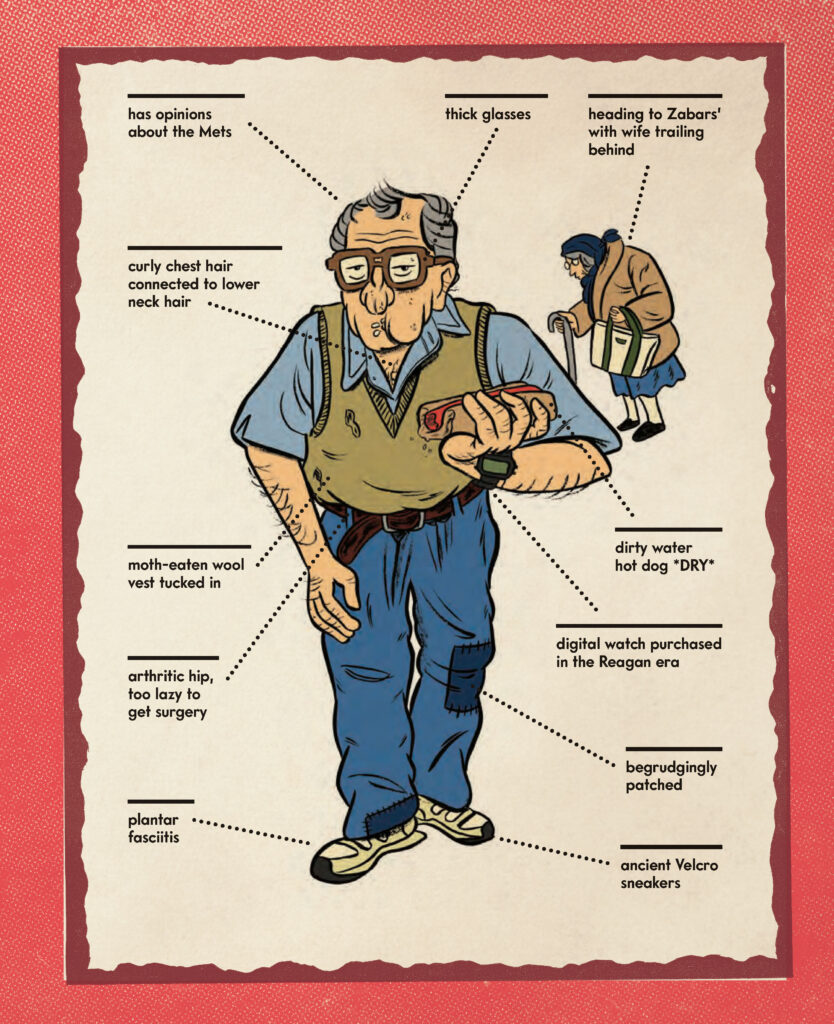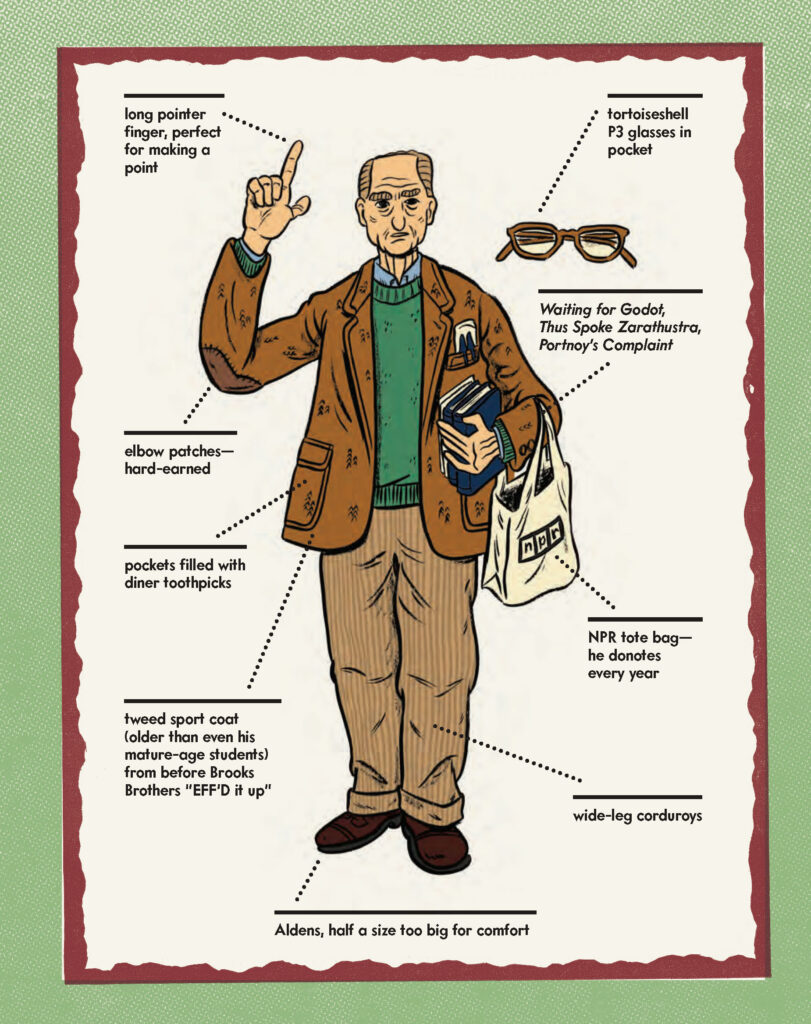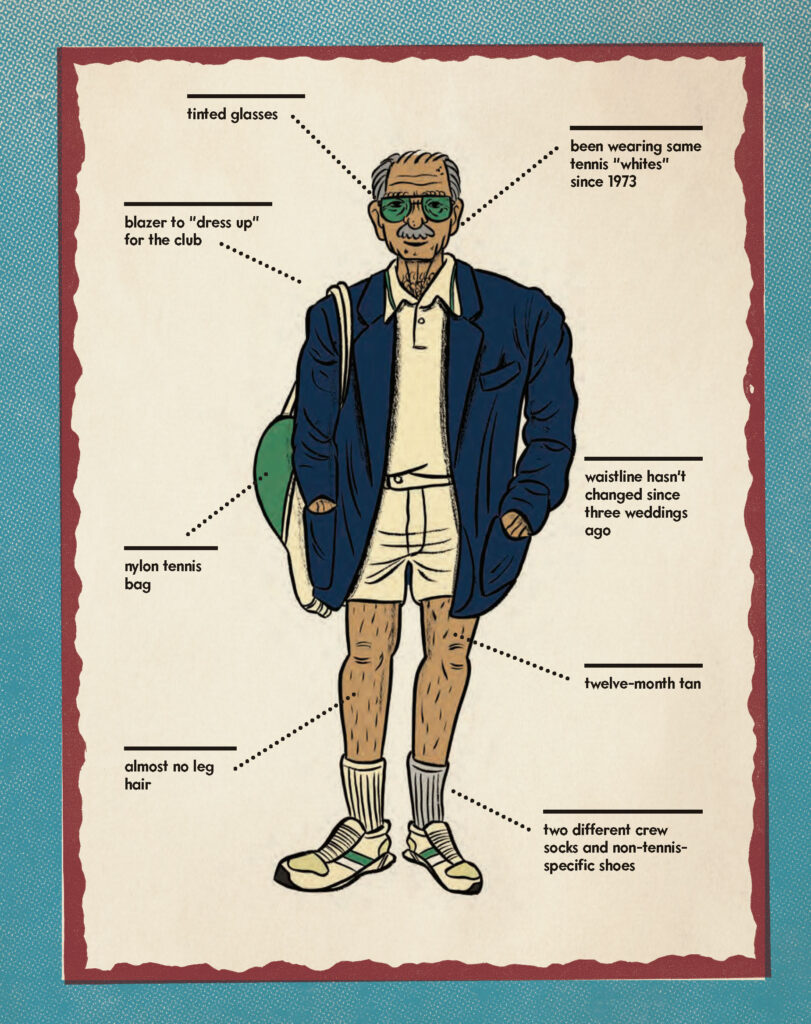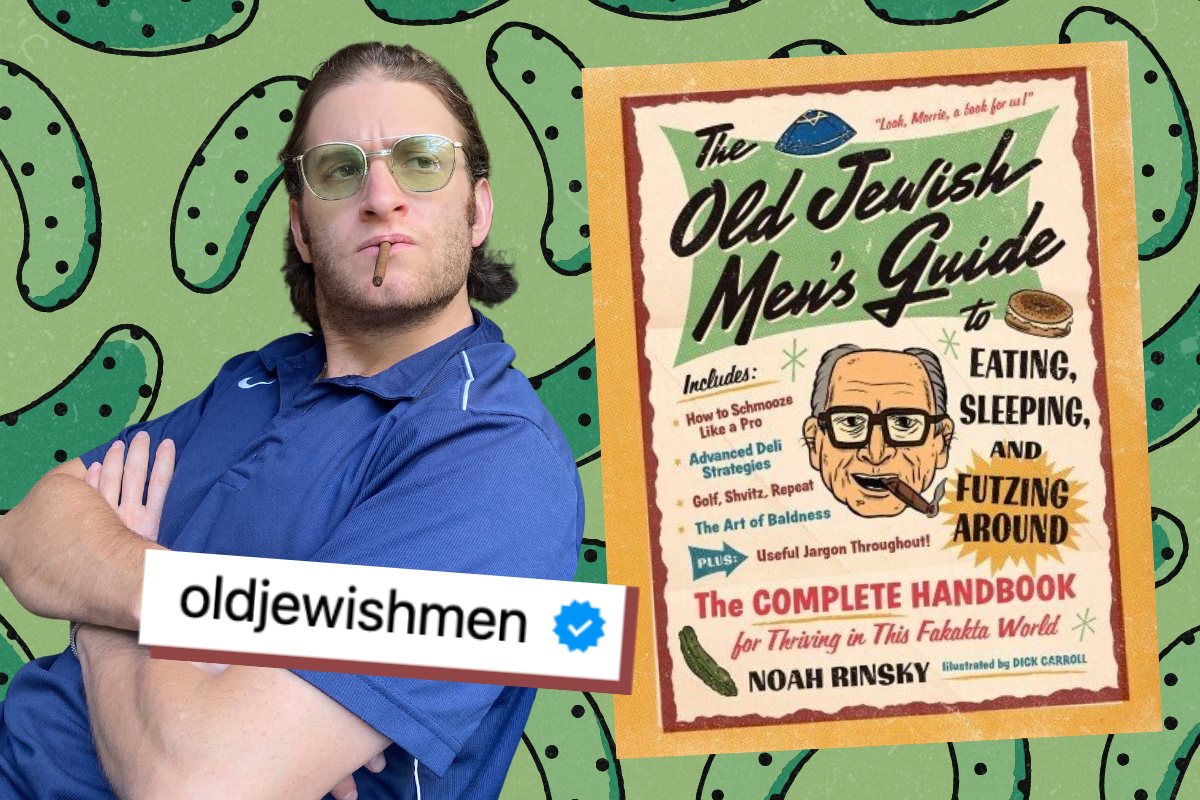It’s unusual that someone beats me to a lunch spot or coffee date. Habit and a lifetime of perpetually early parents means that I’m usually waiting five to 10 minutes before the person I’m meeting arrives. I love my little routine. It’s just enough time to settle in, read the menu and look busy on my phone before the person I’m waiting for breezes in.
But when I arrive at Russ & Daughters Cafe for our interview, Noah Rinsky is already sitting comfortably in the window next to the host stand, waiting for me. I don’t actually know for sure it’s him, at first. I’ve never met the 35-year-old writer and social media creator before. But even if I hadn’t known what he looked like from his Instagram page, I would’ve definitely known once he revealed his outfit. When Noah looks up at me, his outfit comes into full view. He’s wearing a gray baseball cap with the name Ralph Lifshitz and the Polo Ralph Lauren logo embroidered across it and a bright red t-shirt that read “Oedpius: the original motherfucker.”
Oh yes, this has to be him: the young Jewish guy behind the brand Old Jewish Men.
Old Jewish Men, or OJM for short, is a popular Instagram and TikTok account that celebrates the quirky, not self-conscious behavior of old Jewish men. The account posts graphics of OJM style trends, memes about colonoscopies and egg salad and satirical videos starring a coterie of real-life old Jewish men elevating their predominantly Ashkenazi OJM-ness for the camera. You might even be familiar with viral videos of Dave Roffee and Aaron Cohen, both 72 years old, fighting over Costco rotisserie chicken, 75-year-old Bob Terry fitting Dave in a tank top that reads “Pickle Princess,” or the whole bunch protesting things like the price of pastrami or the lack of public toilets in New York. If somehow you haven’t, then perhaps you’ve seen people wearing OJM merch like t-shirts that change the IBM logo to say “IBS” or items reminding us that before there was Ralph Lauren, there was Ralph Lifshitz from the Bronx — like the hat Noah wore to our lunch.
But what you won’t see in OJM’s content or on its website is Noah Rinsky himself. On the one hand it makes sense: Noah isn’t an old Jewish man yet. But on the other, it turns him into an elusive figure. Beyond a love of old Jewish men, who is this guy? And on a deeper level, what inspires his love of Yiddishkeit elders? That’s what I’m at lunch to find out.
We’re seated quickly after arrival in a comfy booth. On the wall above our table is a large, framed photograph of a large, presumably Jewish man with a thick, wild beard, sport coat, herringbone driver’s cap and circular glasses. He is behind the counter at the Russ & Daughters location on Houston Street. He’s mid-sentence, perhaps complaining, and gesticulating at someone off-camera. Next to the man stands a woman in a white coat, with dark rimmed spectacles and a beehive hairdo. The photograph immediately catches Noah’s attention, so much so that he’s a bit distracted when I ask him to tell me about himself. He pauses. “I’m probably exactly who you think I am. Except for, I happen to have a thing for old Jewish men. You know, whatever that means exactly. I guess I just have a different beauty standard,” he offers.
“So it’s an aesthetic thing?”
“I think it’s a little more. It’s the whole package. It’s like what this guy represents, you know?” he says, pointing to the photograph of the man. “It’s a way of going through the world. As a young guy, I’ve just always kind of aspired to be that kind of guy.”
I get his meaning, but I feel a bit of reticence from Noah to talk about himself. I decide not to push it right away. Instead, I ask him about how he met his collection of Old Jewish Men. (Bob at the Chabad they both attend, Aaron via a Craigslist ad and Dave when his wife reached out after reading about OJM in the NY Post.) We pause briefly to order. (Blintzes for the table, a cucumber soda for me and a lox scramble with a toasted bialy and coffee for Noah.) And then we dive into talking about Noah and OJM’s latest project, a book titled “The Old Jewish Men’s Guide to Eating, Sleep and Futzing Around.”
The book, which comes out today, is written by Noah with illustrations from Dick Carroll and has everything you need to know about the OJM lifestyle. The guide covers topics such as which delis are up to snuff, what to eat there and how to live forever. Helpfully, “The Old Jewish Men’s Guide” also breaks down Old Jewish Men into 10 recognizable archetypes like the Grumpy Intellectual and the New York Schlub. But the book also has a community-effort quality to it. Short essay interludes from interesting Jewish culture hounds abound in the book. Writer and “great [OJM] prospect” Jason Diamond sings the praises of LA’s Langer’s deli and offers advice on how to wear a chai. Stylist and Interview Magazine editor Mel Ottenberg recalls trying to negotiate with Larry David. And Vogue writer (and Noah’s wife) Liana Satenstein lays out the benefits of being bald.
The book is overflowing with tips, hacks, fake — and maybe some real — OJM quotations, diagrams, quizzes and lists. One could spend weeks examining every perfect detail, and somehow Noah is already working on his second OJM book. “It’s a little bit more historic. It’ll maybe actually have more real information in it, but not too much,” he shares, cryptically.
And then the food arrives. As we eat, the vibe of our meeting shifts from interview to a conversation among peers and I feel Noah open up a bit. It’s at this point in the conversation — and, frankly, once I get home and do some more research after our lunch — that Noah Rinsky came into clearer focus.

Despite appearances, Noah is not a native New Yorker. He’s originally from Colorado Springs, Colorado, the son of Jeff Rinsky, a psychiatrist, and Rita Zimmerman, an artist who has painted the likes of Menachem Begin and Elie Weisel. In his estimation, his hometown was a gorgeous “cultural wasteland” — unless you like rock climbing and hiking. Before that, his family on both sides hailed from Cincinnati going back four generations.
“We had a deli in downtown Cincy called Temple Delicatessen that was open for about sixty years. My mother worked there, my grandmother and grandfather worked there, and my great-grandma started the deli with her husband,” he explains to me. “My great-grandmother, who I had the pleasure of meeting, was a real tough broad. She was a professional baseball player during the war, and most days would wake up at four in the morning to start prepping the sandwiches. She lived to be 97. I think morning calisthenics and chopped liver had a lot to do with her longevity. Protein, ya know? Who knew?”
But in Colorado Springs, the Jewish community was far less robust. Noah’s connection to the community seems to have been contained within his family unit. He had and still maintains a close relationship with his older brother, Ephraim, now a detective novelist who writes under the name E.Z. Rinsky. “I think my brother and I had to develop whatever being a Jew in Colorado is very fast,” he tells me. “The Coen Brothers grew up in a tiny town in Minnesota and they were just like, total weirdos. I like to think that we had a similar experience to that.”
His fascination with old Jewish men goes all the way back to this time in life. His parents would take him and his brother to Orthodox shuls for the experience of it, though he says he grew up “sort of Modern Orthodox,” keeping kosher at home but perhaps driving on Shabbat. “My brother and I would always find the guys in the corner and chuckle about the way that old Jewish men behaved, like they were a different sort of species with all the weird things that they do like stuffing herring in their pockets.”
He stayed in Colorado long enough to attend the University of Colorado Boulder where he studied English, but after graduating in 2011 he promptly moved to New York. He shared a studio apartment with Ephraim on the Lower East Side near the East River and held a few odd jobs. He was a tea and spice salesman, got his real estate license and then worked at Zinc Bar, the jazz club, for many years as a bartender and later as a booking agent. (“I booked Please Don’t Destroy before they were big shots,” he tells me.) But regardless of what he was doing to make money, Noah’s ultimate ambition was to be a fiction writer and filmmaker, and he kept a strict writing schedule. He co-created a web series with his brother called “Cave Dwellers” and sold a couple of non-comedic scripts in Hollywood that went nowhere due to the COVID-19 pandemic.
And then, in 2015, he started the Instagram account which would become OJM. Initially, it was called @dadathome and shared photos and videos that Noah took of his father when visiting his parents in Tel Aviv. (The pair retired there that year.) After returning to the states, however, Noah changed the handle to @OldJewishMen and started posting about the older Jewish men he saw around his neighborhood. Around 2021, Noah released a run of OJM t-shirts and when they sold out quickly, he realized he might have a business on his hands. He met and partnered with his current business partner Bryan Seversky to design more apparel and turn OJM into a pseudo-lifestyle brand. From there, the account slowly morphed into memes and videos, bringing in the characters that we know and love like Dave, Bob and Aaron.
It’s proven to be Noah’s opportunity to carve a niche for himself in the writing, filmmaking and content-creation space, all the while connecting him to the Jewish community in a way that he’s never quite felt before. “I was never this involved, really,” he explains. “I used to go to Stanton Street Shul. My brother was a president of the shul — the youngest president, I think, in Stanton history. But he was always kind of the star. I was just kind of the background guy, Ephraim’s little brother.”
Through OJM, he’s released more clothing lines, including the basketball shorts which Larry David wore in an episode of the last season of “Curb Your Enthusiasm;” a nod which Noah considers the “ultimate compliment,” heightened only by the fact that “Curb” co-star Jeff Garland confirmed for Noah that Larry David has no idea what OJM is. Last year he co-wrote and co-directed “Sauna Dreams,” a short mockumentary which imagines Dave, Bob and Aaron as competitors in the now-defunct World Sauna Championships. (Yes, that was in fact a real thing.) He’s currently in talks with Garland about a potential OJM TV show, separate from an OJM show he started working on in 2021 called “Welcome to Boca.”
Even in his writing projects separate from OJM, Rinsky’s love of old Jewish men seeps in. “I’ve been working on a short story collection about various types of old Jewish men in New York City. I guess I don’t have much range, eh? But I would argue that OJM are not one note. It’s an infinite subject,” he tells me. “The subject of OJM is vast and shouldn’t be limited to social media. It’s my responsibility to cover as many different beats as possible. That’s how you gotta look at it. All these different old guys moving through every major city in the western hemisphere, slipping between coffee shops, doctors’ offices, libraries, shuls and golf courses.”
Though he’s quick to clarify that he doesn’t only write about old Jewish men, offering a book he wrote about the New York jazz scene as an example.

Towards the end of our conversation, Niki Russ Federman, the fourth-generation co-owner of Russ & Daughters, stops by our table to check in on what Noah referred to as “a meeting of the minds.” How were the blintzes? Lush cream, crisp exterior and tangy blueberry compote. Far better than the only thing close I’d ever tried: a soggy Russian blini I’d had as a college student studying abroad in St. Petersburg. And the lox scramble? Delicious, Noah offers, before turning to the framed photograph on the wall once more. “Who is he?”
Niki replies: “That’s Zero Mostel!” Of course. How auspicious that our conversation was taking place in front of the famed actor best known for originating the role of Tevye in “Fiddler on the Roof” on Broadway in 1964. An old Jewish man par excellence. The woman next to him is Niki’s great-aunt Hattie, one of the “& Daughters” of Russ & Daughters.
“Story goes that Zero wanted to marry one of the daughters. And my great-grandfather put the kibosh on it, he said, ‘No, this guy is too meshuggeneh. He’s an actor. He’s not gonna be a good worker.’ He cared about getting labor from his sons-in-law,” Niki recalls for us, laughing. “So Zero just stayed a friend of the family.”
Of course, Niki’s great-grandfather Joel Russ was, too, an exemplary Old Jewish Man in his time. “When he was too old to actually work-work — you know how small the shop is? He had a big leather armchair by where the candy side is. He just sat there and dictated things from his armchair,” Niki shares with us. “If a customer annoyed him, for whatever reason, his line was, ‘Lady, do me a favor. Forget the address.’ I’ve only ever used it once — it really got to the point where I didn’t know what else to say to somebody.”
Talk about tradition. Noah and I listen raptly to Niki’s story, both of us seemingly hoping to absorb an ounce of the chutzpah of Joel Russ and Zero Mostel through our ears. Noah and Niki then jump into neighborly chat. They trade thoughts on a new-old burrito place in their neighborhood and Niki asks of Noah’s married life — he and aforementioned Vogue writer Liana Satenstein were married a year ago on the street in Park Slope. Or at least, the chuppah was on the street to fulfill the requirement of the Jewish wedding canopy being under the stars. The party took place later, inside, a raucous affair with more than 200 people — including old Jewish man celebrity Dani Luv, house musician of Sammi’s Roumanian Steakhouse, Noah tells me — and a large hora.
“I don’t think we’re going to do the hora at mine,” I mention off-handedly, having told Noah earlier that I’m currently planning my own wedding.
“You gotta do the hora,” he rejoins, taking part in the time-honored OJM tradition of offering advice no one asked for, but they’re going to hear anyway. I don’t mind in the slightest.
“I know, I know,” I say, getting ready to offer up a quick excuse. “But the wedding is small and despite my fiance and I both being Jewish, neither of us have close Jewish relatives outside of our immediate family…”
“Non-Jews love to do it more than anyone!” Noah says excitedly. “They see it in the movies, they’ve always wanted to do [the hora]. My non-Jewish friends were underneath the chair — they beg you to hold the chuppah. They’re more into it than Jews. Jews have seen it a million times.”
Not always, but sometimes, advice you didn’t ask to hear is sound. “Maybe I will do the hora at my wedding,” I write in my notes.
Our plates are cleared; we’ve reached the end of our meal. Niki thanks us for coming in and gets back to work. Our server swiftly delivers the check. A brief conversation about my tattoos later (“I’ve essentially only gotten tattoos from fellow Jews,” I tell Noah, weirdly apologetic, as if I’m talking to an actual old Jewish man instead of a 30-something fellow writer), the bill is paid and it’s time to go. We follow each other out onto the street in silence, the business of Jewish appetizing still pulsating behind us. But Noah’s already onto the next thing — namely immediately joining a conversation taking place on the sidewalk between Josh Russ Tupper, Niki’s cousin and fellow co-owner, and actor Liev Schreiber.
I know I won’t remember exactly what they’re talking about when I get home to write about Noah. I’m dumbfounded that not only is Liev Schreiber standing right in front of me, but that Noah so comfortably launches into kibbitz with him. They don’t know each other formally, but I think Schreiber remarks that Noah looks familiar. Had they run into each other at a party once, he wonders. Yes, Noah confirms, a caviar party. But they didn’t talk there, they were just in each other’s periphery. Schreiber says that he had likely seen Noah and “stared at him across the room covetously.”
I sense I’ve missed something. But I cease trying to make sense of the interaction. I just stand there for a moment, watching the group talk while I gather my thoughts.

I hadn’t been sure of what to expect when I met the young Jewish man behind old Jewish men. I can’t say I would’ve been surprised had I found myself sitting across from someone with put-on Yiddish affect, wearing a costume of the stereotype of what late-in-life Jewish men look like. And maybe Noah’s affect is a little bit put-on. Regardless, the way he calls someone “a tough broad” or wears smart-guy t-shirts or comments on the dollar amount of salmon in his meal or can and will talk to anyone about anything is part of the world he lives in and clearly feels a deep admiration for. Noah isn’t just lovingly jabbing at old Jewish men through OJM. Intentionally or otherwise, he’s documenting and thereby persevering a way of Jewish life defined by immigrant culture and proximity to the Old World that won’t always exist. Old Jewish men are both physically and symbolically a dying breed.
Opaque as it was, Noah wasn’t wrong when he told me at the very beginning of our meeting: “I’m probably exactly who you think I am.” And because of it, Noah Rinsky is doing us all a mitzvah.



